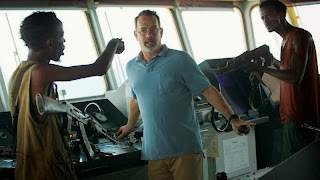Can’t We All Just Get Along is a segment in which I take a hot button issue in the entertainment world and try my best to see both sides through, and then try even harder to pick a side.
In the past, an acclaimed box office hit had at least a few months of a grace period before the backlash set in. Now, all it takes is a few hours.
When somebody wants to pick a film apart but doesn’t have any actual problems with its writing, directing, acting, editing, etc., then the next logical step is to attack its plausibility. Over the past two weeks, the two biggest hits at the box office, “Gravity” and “Captain Phillips,” have come under fire mainly from people who don’t work in or write about film.
This whole kerkuffle began the same day that “Gravity” was crowned box office king. Astrophysicist and generally awesome human being Neil deGrasse Tyson sent out a series of Tweets criticizing the scientific accuracy of “Gravity.” His comments came under fire because how dare he know real science. And where was he when “Jimmy Neutron” came out? Somebody needed to tell the world that human children can’t actually breath in space without a suit.
Anyway, these comments struck a nerve in “Gravity” fans across the globe, including me, who just want to live in a world where “Gravity” is absolutely perfect. However, while these Tweets can be seen as critical, I don’t think Tyson was saying that “Gravity” is bad. Rather, he is an astrophysicist who is used to looking at real space so clearly his mind can’t go in any other direction. There is a difference between saying a movie is inaccurate and saying that a movie is bad.
There is a little disclaimer that Tyson should have added: sometimes a movie needs to embrace inaccuracy in order to tell a good story. “Gravity” might not have been the same movie had they taken the time to explore how far communications would actually reach in space. “Gravity” is not a documentary and never pretends to be. Movies are really more about emotion over logic. “Gravity” is supposed to simulate the feeling of being in space, not necessarily the actual experience. A planetarium is meant to show you what space actually looks like. A movie like “Gravity” is more importantly about the fear of free floating through an infinite universe.
From now on, movies should be defined by truthiness as opposed to truth. Which brings me next to “Captain Phillips,” which is even more complex than “Gravity” when it comes to the truth. “Captain Phillips” has been praised for its realism. Its status as a “realistic action thriller” was compromised on Monday when a bunch of members from Captain Phillips’ real crew took to the New York Post (a.k.a. the world’s best headline creator) to refute the film’s portrayal of the events. They allege that the real Captain Phillips had a reputation for being “sullen and self-righteous.” They also claim that he endangered them by bringing the ship so close to the Somali shore and that he didn’t follow safety protocol as closely as the film believes he does.
The crew members case against Waterman Steamship Corp. is still under way, so the honesty of their claims is still up in the air. If these accusations are true, it definitely spells trouble for “Captain Phillips.” There are some films that can get away with skewing history because the changes are so drastic that they are clearly intentional (see: “Inglourious Basterds,” “The Social Network”). However, “Captain Phillips” landed in a pickle because it presents itself as a completely matter-of-fact portrayal of history. Paul Greengrass’ reputation for realism proceeded him (see: “United 93″). It was his duty as a director, as well as the writer who adapted Richard Phillips’ book, to do some extra research.
Then, there is the case where the inaccuracies, whether intentional or not, actually benefit the film. “Captain Phillips” might have been a more interesting movie had they shown Phillips having to overcome his arrogance for the sake of his crew. It is definitely more layered than the Phillips scene in the movie, who is portrayed simply as a genuine working class guy. The Richard Phillips of “Captain Phillips” is a man who always follows the books and is always over-prepared. The film shows that there are certain things that no amount of preparedness can actually fully prepare you for. Apparently, the real life Captain Phillips was aware of this.
Here’s the real issue: had “Captain Phillips” followed the actual events moment-by-moment, then it might not have been as enthralling. Movies are not meant to represent a whole truth, so in cases like these, its helpful to separate the truth from good storytelling. Factual errors are worse when they seem like they could have been avoided. This isn’t a “Braveheart” situation where every inaccuracy could have been fixed. They even got the the use of kilts wrong and while taking kilts out would have prevented the scene where the Scots moon all of the English soldiers, I think I speak for most people when I say that I could have done without that.
Overall, it is impossible to portray reality 100% accurately. There are just so many moving parts that we don’t even know are out there. “Gravity” should be rewarded for at least bothering to do research and “Captain Phillips” should be praised for actually giving the Somalis a voice. There are so many other movies out there right now that get it all wrong that nobody is even talking about. While it is necessary to keep all media in check, it seems like these two movies are being very specifically singled out. They both have been making a lot of money. Basically if you want to make a lot of money in Hollywood, then you’ve also got to prepare to be picked apart.


